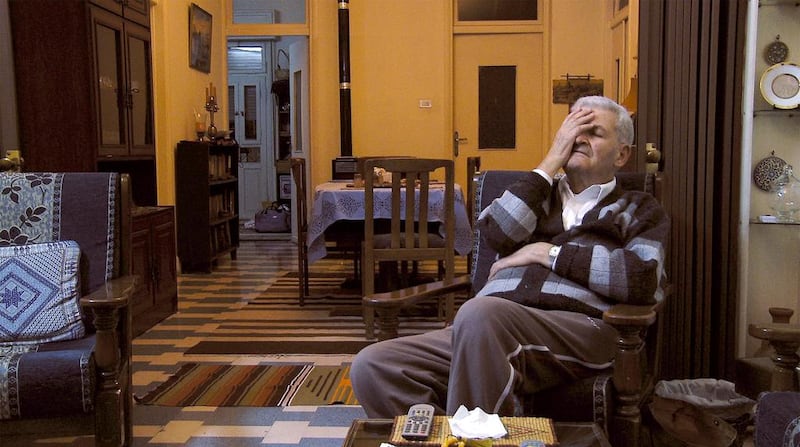Elias Shoufani, a former leader with the Palestinian Liberation Organisation and a writer, was such a private man his eldest daughter didn’t know much about him until she was an adult.
The Dubai-based poet and filmmaker Hind Shoufani had been unaware of his involvement in the Palestinian cause, his contributions to the PLO and eventually his resistance to its position under the leadership of Yasser Arafat. The 36-year-old Palestinian, who grew up a refugee and with her family in upheaval because of her father's decisions, remembers him as a “hands-off father”.
When she approached her father five years ago, asking to chart on film not just his political life from 1943, but also how it impacted their family, his apprehension was palpable. The result is Shoufani's feature-length documentary Trip Along Exodus, about the filmmaker's attempt to connect the dots about her extreme leftist father against the backdrop of the Palestinian revolution and the current turmoil in the region. The film debuts at the Dubai International Film Festival on Friday.
“When I first began filming, he refused to discuss anything personal,” says Shoufani, who began recording their conversations during visits to Damascus, where he was living in exile.
“He kept it to politics and history. He would always insist on getting dressed. He would put on a sweater or jacket and tie. He wouldn’t allow me to film him eating, writing or watching TV, at first, saying ‘I’m not an actor!’ But over time, he got comfortable. He would be in his pyjamas and I began getting more personal stories. He started discussing my mother a little bit, even though it was difficult for him to talk about personal, sad things. Many times I don’t think he knew the camera was rolling.”
The film shifted focus when her father died suddenly last year at the age of 80. Despite the turmoil in Syria, she went to Damascus to hold a funeral, where she was harassed by authorities while trying to shoot footage for the documentary.
Shoufani, who has a master of fine arts degree from New York University, has combined interviews with her father, his colleagues and friends with family photos and archival footage from his political career. The documentary, with English voice-over and subtitles, reflects an eccentric style, a melange of glitter, bold colours and poetry layered over sombre images and presented in the form of a book with more than 20 chapters. She called the impulse behind it both personal and “Shakespearean”.
“I realised at the age of 28 that my father was very much a tragic character, a noble strong man but with a hamartia [tragic flaw]. The fact that he did not participate in our upbringing, did not have a family life, was more interesting to me than the politics. I’ve always been more interested in the sacrifices people make for the Palestinian cause.”
Limited childhood memories also prompted the project.
“My sister and I lived with my mother in Jordan, while he was in Syria. We saw him every six months. And during that time he was always writing in his office, or meeting military men and watching the news. So my memories of him are a lot of bodyguards, guns in the car and house. I did not know what he did.”
Shoufani’s family is from Galilee, the northern part of Israel. Her father lived through the 1948 Palestine war, moving to the United States in the 1960s and eventually acquiring a doctorate in Islamic history from Princeton. This multilingual and author of 25 books married an American and taught university in Maryland and Georgetown, all while supporting the Fatah movement. But when the revolution began gaining momentum back home, he decided to return to the region in 1973, discarding his American and Israeli passports and divorcing his wife. He joined the underground PLO movement in Beirut, becoming an analyst of Israeli affairs and Zionist ideology and remarried a Palestinian-American, with whom he had two children – Hind and her sister Noor.
Eventually, however, he and several other members became disillusioned by Arafat’s political route, which led to an uprising and an opposition within the organisation.
“My father was a true socialist,” says Shoufani. “Everything he did was for the people. He never approved of the powers that be. He was opposed to the ways of Arafat. He left the PLO around the time of the Oslo Accords because he gave up.”
Shoufani last saw her father in 2011, after which she recorded all their telephone conversations for the film. At the time, when the early uprisings in Syria seemed like a positive change in the region, she had planned to end the film with a message of hope.
“I don’t think I’m that positive anymore. The situation has got worse,” she says. “I want the audience to be infuriated at the politics of the region and question why we are in this horrible position. I also want them to think my father was a noble, honourable man and learn from the lessons he talks about. I also want them to be emotionally disturbed at the reality of Palestinian families. Every story in the Palestinian community is plagued with suffering, separation and loss of some sort.”
• Trip Along Exodus will be screened at Mall of the Emirates on Friday at 8.30pm and December 15 at 9.30pm. Tickets cost Dh35 and can be booked on www.dubaifilmfest.com
aahmed@thenational.ae





